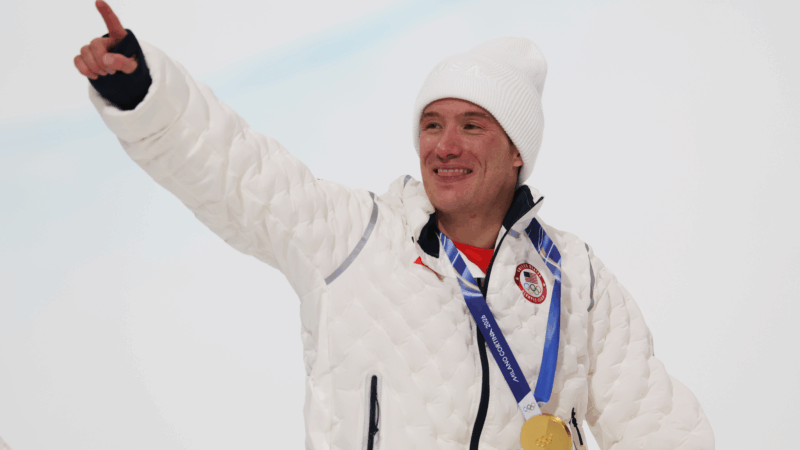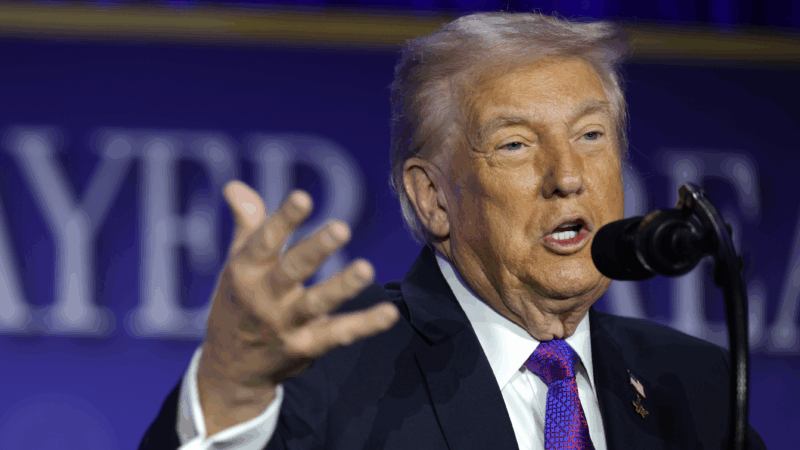59% of Americans disapprove of RFK Jr.’s moves as health secretary, a new poll says
What people believe about health increasingly depends on how they feel about politics, according to a new poll.
Consider President Trump’s Sept. 22 warning about acetaminophen, the active ingredient in Tylenol. KFF, the nonpartisan health policy research organization, polled voters about Trump’s statements the day after he made them.
“What we see is that it’s hugely divided among partisans,” says Ashley Kirzinger, the associate director of polling for KFF. The poll found 59% percent of Democrats believed President Trump’s statements about Tylenol were “definitely false.” On the other hand, an almost equal percentage of Republicans — 56% — believed the claim to be either “definitely true” or “probably true.”
There is no scientific research showing a causal link between acetaminophen and autism. But Trump told pregnant women to “tough it out” and avoid taking the popular pain reliever in an unusual press conference last month. Physicians’ groups, meanwhile, continue to reiterate that it is the safest medicine to take in pregnancy, when untreated fever or pain can cause other problems.
The poll, which also asked voters about other topics, offers a window into how dramatically public opinion has changed, along with federal health policies.
The poll found the Centers for Disease Control and Prevention has seen a precipitous decline in public trust — most recently among Democrats, as the Trump administration works to dismantle many of its mandates. Kirzinger notes a 24% decline in trust in CDC’s vaccine information among Democrats, just in the past two years.
Kirzinger says polls historically have consistently found that people trust their doctors the most when it comes to getting advice about their own health. But increasingly — and especially after the appointment of Robert F. Kennedy Jr. as Trump’s secretary of the Department of Health and Human Services — she says party lines are more critical in determining what sources of information people rely on as the basis for their health decisions. “Among Republicans, RFK is as trusted … as their own health care provider,” Kirzinger says the data shows.
And yet, overall Kennedy’s job approval rating ranks low; the poll also found 59% of people — mainly Democrats and Independents — disapproved.
Kirzinger says as faith in federal health agencies declines, people are turning to very different sources.
Democrats say they’re relying on professional medical groups, like the American Medical Association. “More than eight in ten Democrats say that they trust the AMA or the American Academy of Pediatrics, but among Republicans, it’s only about half,” Kirzinger says.
What this means is the landscape of public health is very fragmented, and people are making choices based on very disparate beliefs. “As people are going to different sources of information to make decisions around their health care. We’re going to see partisanship playing a big role in what people decide to do,” she says.
In Berlin, there are movies, there’s politics and there’s talk about it all
Buzz around whether the city's film festival would take a stance on the war in Gaza has dominated conversation in recent days.
Alex Ferreira wins 10th gold medal for Team USA, matching America’s highest total in Winter Olympics
Freeskier Alex Ferreira clinches a tenth gold medal for the U.S. in these Games, tying the U.S.'s all-time record for gold medals in a Winter Olympics.
Trump calls SCOTUS tariffs decision ‘deeply disappointing’ and lays out path forward
President Trump claimed the justices opposing his position were acting because of partisanship, though three of those ruling against his tariffs were appointed by Republican presidents.
The U.S. men’s hockey team to face Slovakia for a spot in an Olympic gold medal match
After an overtime nailbiter in the quarterfinals, the Americans return to the ice Friday in Milan to face the upstart Slovakia for a chance to play Canada in Sunday's Olympic gold medal game.
NASA eyes March 6 to launch 4 astronauts to the moon on Artemis II mission
The four astronauts heading to the moon for the lunar fly-by are the first humans to venture there since 1972. The ten-day mission will travel more than 600,000 miles.
Skis? Check. Poles? Check. Knitting needles? Naturally
A number of Olympic athletes have turned to knitting during the heat of the Games, including Ben Ogden, who this week became the most decorated American male Olympic cross-country skier.








